#bbc dickensian
Explore tagged Tumblr posts
Text
Joe was about 20-21 during the filming of Dickensian
Eddie is about that age in ST season 4
So if you wanna know what a 20-ish year old boy looks like, watch Joe in Dickensian. He’s so baby-faced
38 notes
·
View notes
Text
he’s silently judging your pathetic cock
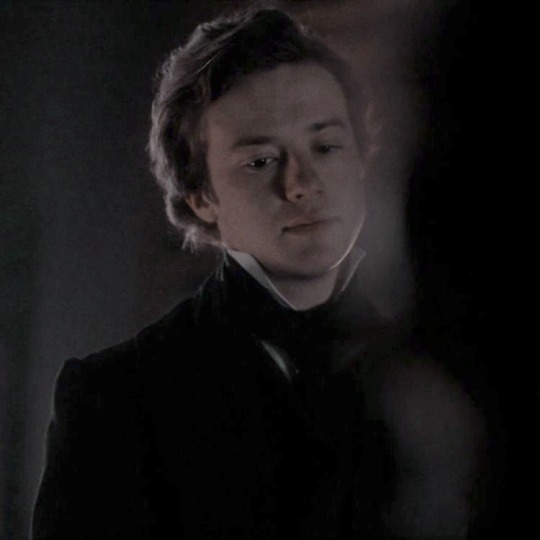
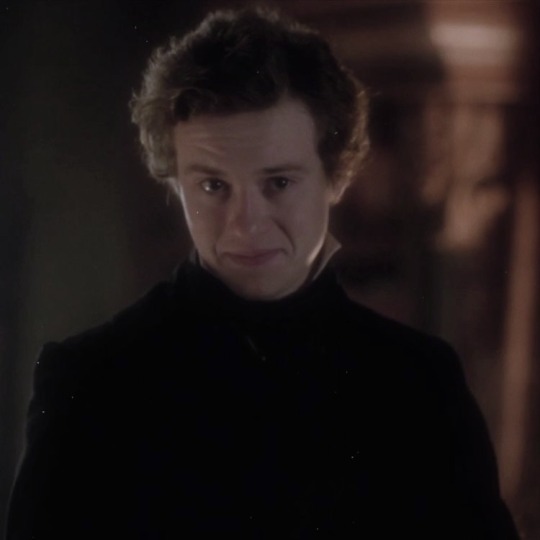
#arthur havisham#joseph quinn#bbc dickensian#arthur havisham smut#joe quinn#dickensian#arthur havisham x male!reader#amab reader#arthur havisham x reader
54 notes
·
View notes
Text
youtube
Happy Holidays everyone.
#dickensian#a christmas carol#scrooge#charles dickens#bbc dickensian#Youtube#muppets christmas carol#the muppets christmas carol#upstart crow#scrooged#ebenezer scrooge
1 note
·
View note
Text
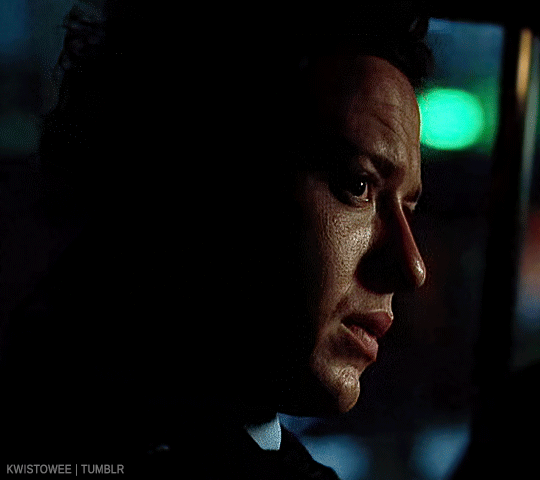
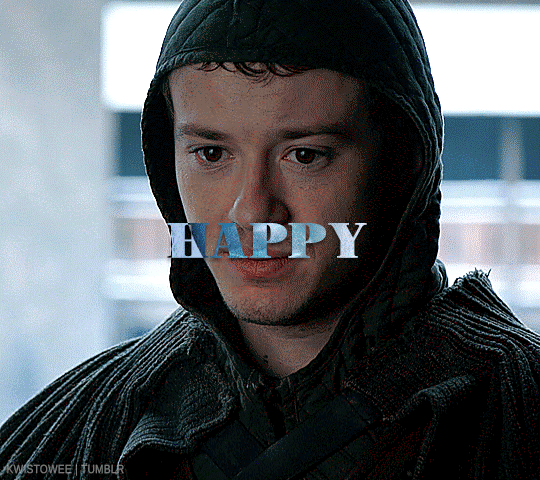
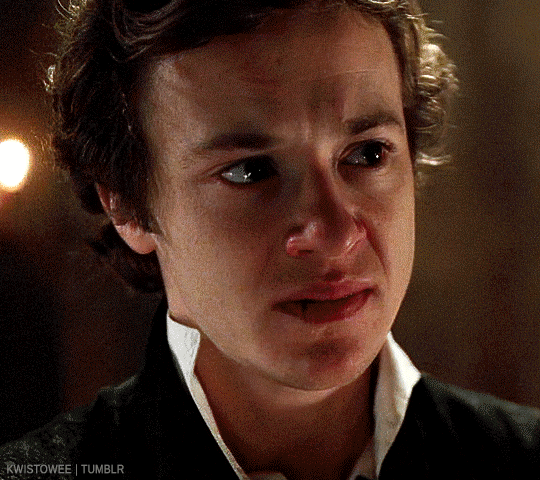
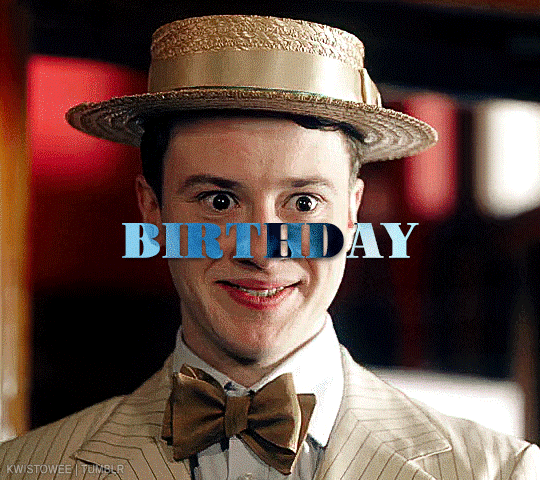
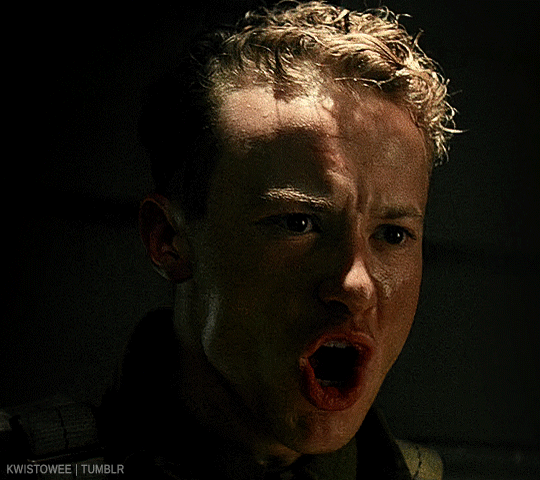
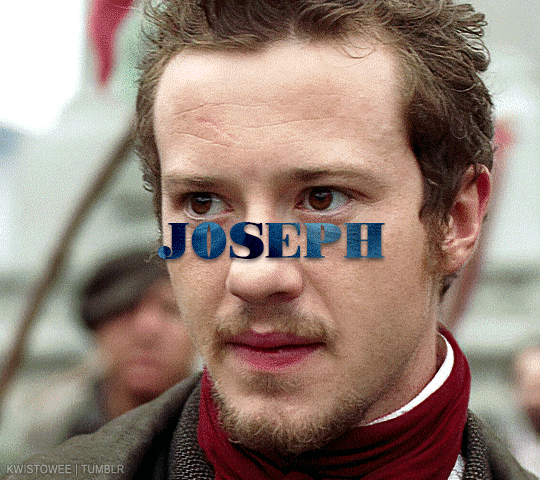
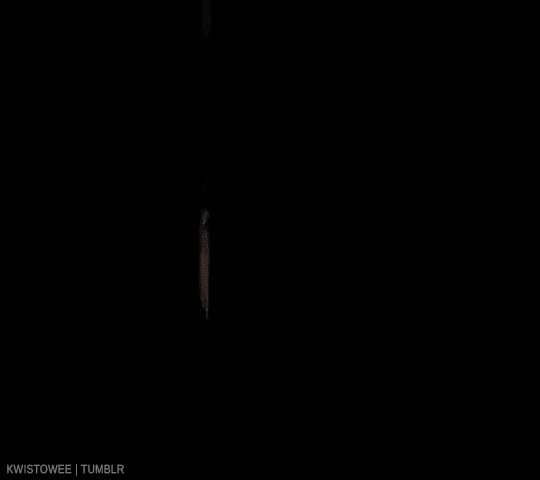
Happy Birthday, Joseph Quinn! January 26th, 1994
#josephquinnedit#jqedit#joe quinn#joseph quinn#arthur havisham#dickensian#ralph penbury#timewasters#enjolras#bbc les mis#koner#game of thrones#userspacey#anztag#usersugar#cinemapix#mediagifs#userthing#dailyflicks#my*gifs#i share a birthdate with this handsome lad#probably#i swear we'll learn yet another potential birthdate at some point
483 notes
·
View notes
Text
Favourite Joseph Quinn Character (not Eddie, but including upcoming films too)
doing a little thing don't mind me.
#joseph quinn#gladiator ii#time wasters#a quiet place day one#hoard film#dickensian#fantastic four#les mierables#bbc strike#howards end#joseph quinn characters
8 notes
·
View notes
Text
What phantasmagoria is this? - The Unquiet Dead, 2005
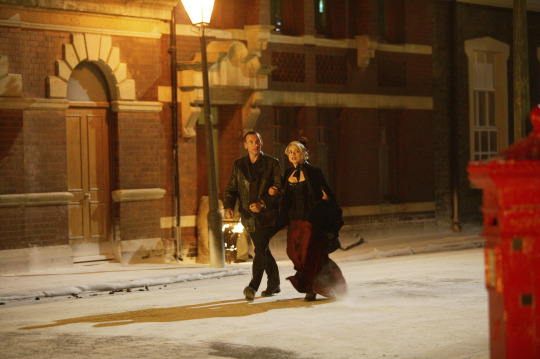
There is an element of fun to be derived for anoraks such as ourselves in exercises of comparison and contrast. One such game I have been musing upon lately relates specifically to Doctor Who writers of the original and revived series. For example, Steven Moffat is the modern Robert Holmes, Russell T Davies something more like a Terrance Dicks and Mark Gatiss, the subject of today's discussion, is perhaps more akin to a Bob Baker and Dave Martin. To a certain kind of fan, this might sound incredibly derisive and, to an extent, it is but it is worth noting that the original series' Bristol Boys were hardly hacks or even especially poor writers. Between the two of them, as a partnership or otherwise, no less than nine stories were broadcast in their names over eight years and every single one of them is bristling with creativity and energy. If anything, the downfall of Baker and Martin was that they brought too many ideas to a Doctor Who script. But despite really nobody pointing to any one of their serials and crying "Yes, that one's my favourite", it would be ludicrous to suggest their work left little impact with iconography of Axons, the Mutts, K-9 and Sarah Jane's Andy Pandy costume being etched into the minds of audiences for years to come.
And Gatiss is much the same. Contributing just as many stories over a twelve year period as well as appearing in front of the camera and helming one of the show's finest spin-off ventures, his legacy is arguably even harder to ignore. True as it is that he was never awarded tasks as monumental as The Three Doctors or The Hand of Fear nor creating something as iconic as K-9, Gatiss' unwavering position as the Moff's reliable partner ensured his mark on the series would be left no matter what he was writing and, even then, what he was writing did offer up its fair share of iconic moments. Like the kids who grew up with the Bristol Boys, you'd be hard pressed to find a fan my age who was not unnerved by the peg dolls, introduced to the Ice Warriors or able to recreate the exact cadence of Maureen Lipman's "HUNNNGRYYYYYYYY" at a moment's notice. Hell, they probably even learnt who Winston Churchill was thanks to him. Yet, the comparison still is not flattering. At the end of the day, I am celebrating Mark Gatiss for being a competent writer during two eras of Doctor Who where the overall production was some of the best it has ever been at every level.
With this in mind, perhaps the most fascinating aspect of Gatiss' legacy is the one he was never allowed to have – the showrunner. Gatiss pitched a complete reboot of the series with G*reth R*berts and Cl*yton H*ckman but obviously lost out to Davies and, it has to be said, the prospect of even one full season of stories that are about as strong as Empress of Mars and The Shakespeare Code is hard to get excited about. There were some potentially interesting aspects such as the Doctor being introduced as an antique shop owner, the continuation of the serial format and Derek Jacobi as the Doctor. All of these things could have made for something entertaining to watch.
But reflecting on this pitch gets us to the biggest problems with Mark Gatiss as a Doctor Who writer and, arguably, the same things that made him the perfect co-writer for Sherlock; he is an old-fashioned, conservative writer and a dreadful romantic for all things nostalgia. His scripts are like the TV equivalent of an interactive museum exhibit that passionately recreates bygone eras. Sometimes this comes good, sometimes it does not but they are qualities that make it hardly surprising that Russell T Davies found him the perfect person to pen the very first historical revived Doctor Who.
Like practically all of Davies' initial run on the programme, My Name's Dickens... Charles Dickens (as it was originally titled) came about from a brief he hired Gatiss to fill. Davies insisted that the story take place in Cardiff, be set during the Victorian era and feature Charles Dickens in an adventure with charlatan medians. Gatiss' original pitch was entitled The Crippingwell Horror and took place in a hotel for fake medians with the character that would becomes Sneed being an employee who suddenly realises his powers are not a mere act. Interestingly, the original script would have drawn some similarities with The Empty Child two-parter with the character that became Gwyneth being haunted by the ghost of her recently deceased brother. Across the various drafts and at the production team's behest, the script became a less and less grim affair with a healthy injection of humour and self-awareness. The concept of the Gelth, however, was present across all versions with Gatiss taking inspiration from a childhood nightmare for the image of the possessed Mrs. Pearce.
In the context of its home season, The Unquiet Dead is perfectly slotted. The third story (and episode) of the season, it follows The End of the World with something completely different. It shows the full breadth of the programmes basic possibilities across three weeks and sets the template for the three modes Doctor Who will continue to alternate between and subvert until the present day. This was probably disappointing for some longterm fans as it does lay down a fundamentally different foundation to the 1963 season. In Verity Lambert's first three stories, Doctor Who was a survivalist drama that oscillated between educational historical settings, futuristic political allegories and surrealist horror flavours. Davies' Doctor Who was a soap opera that shifted between satires of contemporary England, futuristic camp absurdities and pastiches of revered literature. Neither of these is more valid but the distinction is essential to understanding how British television had changed over forty years and, indeed, the kind of fans that each version of the programme has continued to garner.
It is also important in understanding what The Unquiet Dead is actually accomplishing as it is essentially intending to fulfil a dual function. The first, as we have established, is to introduce a new audience to the historical Doctor Who but the second, and arguably harder, is to reintroduce fans to the historical Doctor Who. The way it goes about these things is the same; it turns to pastiche. For new audiences, the cultural context of Charles Dickens' writing and his literary depiction of the Victorian era is heavily leaned upon as a shorthand for establishing the world and characters of Gatiss' story. Leaning on tropes and cultural signifiers is an essential aspect of streamlining for the forty-five minute format and really the only choice for a show as fast paced as Doctor Who set out to be. It's a very savvy choice and, to be fair, not an entirely new one since it is essentially something David Whittaker was employing as far back as The Crusade. However, Whitaker never had to contend with the second aspect of this that works which is making the story equal parts a pastiche of the Doctor Who historical arguably a literary style in its own right in 2005. Henceforth, The Unquiet Dead would be just as the general audiences remembered and expected it to be; famous figures from history, gothic horror tones and colourful and exaggerated period stereotypes.
The latter of these two examples, of course, pertain almost exclusively to the mid-'70s period which, fair enough, was when Doctor Who was at its peak of general audience popularity (and even then it's pretty much exclusively Talons of Weng-Chiang we are referring to). As for the first, that practice was pretty much abandoned after The Crusades. No, this is not a genuine Doctor Who historical anymore than this is a genuine recreation of Victorian Cardiff. Rather, it is a streamlined and romanticised version and the one that Gatiss is most fond of recreating (and he would several times after this, even in Sherlock). Authentic to real history and Doctor Who or not, The Unquiet Dead set the precedent for practically every historical episode moving forward with every season (save for exclusively series seven) uniting its main cast with a celebrity historical figure for a heightened romp around some bygone literary tropes.
The more attentive reader would likely have noticed by now that I have been avoiding actually talking about The Unquiet Dead itself for some time now. There is a good reason for this which is simply that, besides the context surrounding it, there is very little to actually say. Even what I have is mostly just production background and reiterating points El Sandifer made years ago now (and more eloquently than me at that). I promised an analysis of the episode so let's just bite the bullet and get on with it. As I have already suggested, there is plenty to like about The Unquiet Dead that makes it hard to write off as some wholly disposable runaround. Being so obviously in the mould of the original show, more so than its predecessors and really any other episode of the first season, there is a simplicity to the affair that I find works to its advantage. There are some mature but simply laid out themes of spirituality versus science that come together rather deftly in a climax that hinges on children realising that an open-mind and attentive nature can allow for new discoveries and broader horizons. The constant reoccurrence of gas as a thematic symbol is effective and easy for children to spot. It provides a coherent, visual link between the Victorian era and the modern day, the old world hurtling into a new age.
Dickens himself is key to conveying these themes as well which is impressive considering that Gatiss was reluctant to include him in his story in the first place. Dickens is portrayed marvellously by Simon Callow, an expert on the author with prior experience playing the character and recreating his public readings. Callow was adamant that for him to sign on, the script would have to be of a sufficiently high quality. Allegedly, his initial reaction to the news that the author would be part of a Doctor Who was disappointment, feeling that fiction often did an injustice to the man. Thankfully, he was very much won over by the material and brought, not only the best performance of anybody in the episode but, some serious credibility to a programme that needed it. Simon Callow does not just sign on for any old slop and why should he when he brings such gravitas and grandeur in his characterisation of Dickens? Callow single-handedly elevates the already solid material to make the part simply superb. Like all the great character actors, and like this episode's approach to history, he may not be one-to-one accurate to Dickens as he was in real history but he embodies his spirit and essence of the author as he is remembered by us today.
So Dickens becomes the heart of the narrative, somewhat inevitably given the mythic status he holds in British literary canon. While Rose is still serving as an audience surrogate in the sense that hers are the eyes with which we view the past (more on that later), it is Dickens who serves a more traditional protagonist role to no small extent. If we consider the Doctor and Rose as analogous for Doctor Who as a series and the Gwyneth/Sneed double-act as our vessels for historical pastiche, Dickens falls in between as the baffled and wry viewer of events who understands the rules of period costume dramas and is being introduced to the weirdness of a Doctor Who story. All of the characters are awarded strong moments but only Dickens receives a full-blown opportunity for change and it is he who actually saves the day (with a healthy dose of real-world science for the kiddos at that). Dickens is the narrow-minded know-it-all whose beliefs are challenged by exposure to a new facet of his world and this, on the surface, is an extremely obvious direction to go. In the absence of a full-blown special, The Unquiet Dead is honorarily regarded by some fans to be the Ninth Doctor's Christmas episode and the allusions to Dickens' most renowned work in that arena are anything but subtle. The door-knocker is a cute touch and offering Dickens his own Scrooge arc, of a sort, works well enough however on-the-nose it is but going so far as to quote the book, not only several times but, as his final line is a level of overtness that I could have done without.
What is more interesting to talk about is Dickens' role in a metafictional sense. Like every story of the first series, The Unquiet Dead is drenched in metatextuality, in this case responding directly to its prior television version. Dickens is the original series of Doctor Who; a beloved icon that still has many fans that has grown stale, burnt its bridges yet continues to go on and on "the same old show... [p]erhaps I've thought everything I'll ever think". Yet, Dickens' worldview is challenged and his morale reinvigorated as the new show, the Doctor and Rose, enter the scene and disrupt his entire understanding. Doctor Who is more than capable of continuing in a new form for a modern world but its older form, the one Dickens embodies, cannot continue alongside it. Zooming out to a broader lens, we can see an even cheekier read where Dickens is symbolic of an entire storytelling approach for science-fantasy and drama that is reinvigorated by the potential of what Doctor Who could be.
Despite Dickens taking over the narrative, the medium aspect was obviously not abandoned and the bridge between the two worlds in this story is not Dickens but literally and figuratively embodied through Gwyneth, played very charmingly by Eve Myles. Gwyneth is the core character embodying the spirituality aspect of the story, essentially serving as the opposite for Dickens. The latter refuses to accept the Gelth exist because they do not fit the facts of his worldview while Gwyneth accepts them more readily than anyone because the facts presented align with her spiritual beliefs. Gwyneth is a medium, communicating with her “angels”, the Gelth, and ultimately understands both conflicting parties’, the Doctor and Rose's, ideologies but refuses both and makes her own choice to help the Gelth, regardless of what others think and makes her own choice to destroy them be sure it is what she believes to be right.
Besides it being a good choice formally to air this episode in the third slots, The Unquiet Dead also lees back an appropriately further layer to the Doctor's character, challenging the audience's morality without ever making him non-empathetic. Plagued by guilt over the consequences of the Time War, still something that we know nothing about beyond the fact that it wiped out there Time Lords, the Doctor offers the Gelth the opportunity to roam freely amongst the bodies of the dead, much to Rose’s disdain. The Doctor's role has little precedent in the televised show, clearly suggesting that his mistake comes from an overwhelming and misplaced emotional response. The Doctor projects his guilt onto a situation that takes advantage of that but his moral position is never seriously challenged. Rose takes a more conservative position which stems naturally from the best scene in the episode where she and Gwen are conversing about their respective upbringings. The scene overtly positions Rose as the educated, condescending lady of privilege which is a delightfully intelligent role to cast her in given her introduction in Rose explicitly establishing the opposite. Rose thinks she knows better than Gwyneth because she thinks she is smarter than her. It could have been a disastrous move and it is impressive that it never paints her in an entirely unlikable light. Importantly too, this scene is written by Russell as a late addition to extend the runtime.
Everything in the story up until here is working but the climax is ultimately where it kind of breaks down and never recovers. The story needs the Doctor to be right for the arc and theme of enlightenment and indulging other perspectives to broaden your own to actually work but it also needs to have an exciting third act with monsters and life or dearth stakes. So, the Gelth are just irredeemably bad beings. As Sandifer exposes in her own essay, this story is infamously criticised for xenophobic undertones regarding the Gelth and she breaks the entire argument down incredibly well. My only addition to that critique is that I think it is barely a matter of conjecture to say that this reading was unintended given Russell's insistence upon recreating the 1980 moment from Pyramids of Mars. The scene was, mercifully, cut but the intention was to explicitly depict a present-day Earth that has been invaded by the Gelth which would have more than doubled-down on their position as irredeemable monsters.
This is not a story about immigration, it is not Flip-Flop, and Rose is never painted as morally correct for insisting that their cohabiting the Earth is wrong. The focus of the conflict is on the whys of their choices, not the what. The Doctor is perhaps the most enlightened, for lack of a better word, of the cast but his emotions override his judgement and he allows the Gelth a way to invade while Gwyneth has an unwavering belief in her angels and the blind faith gets her killed. Dickens is only able to save the day once he accepts that his life has been fundamentally changed which leaves Rose as the one character whose development is somewhat confused. Rose thinks herself superior to Gwyneth due to her relative education and life experience but is shamed by her for assuming she can make decisions on her behalf. The result of this is... nothing really. Rose just sympathises with Gwyneth and is as moved by her death as her two surviving companions and that is about all here is to it. The sombre tragedy of the scene following Gwyneth's death ("She saved the world. A servant girl. No one will ever know.") is staged like a story that is fundamentally about class but The Unquiet Dead just is not. It's not that it doesn't come up from scene to scene but the theme is not a driving force of the story until it very suddenly and awkwardly is.
The Unquiet Dead is a good episode of Doctor Who with a great sense of atmosphere and tonal consistency but is more than a little shy of greatness. The production quality is excellent, the corpses and wonderfully creepy, there are great performances from the whole cast and the only real holes in the production are the lack of ambition in direction and editing (it is cut very slowly) and the surprising lack of score from Murray Gold that is something I would never criticise a story with his name attached for otherwise. The final script here is something much messier than the rest of the production and favours individual moments over a cohesive bigger picture. It is entertaining, clever and the right story to be airing three weeks into the show's run but becomes, nonetheless, somewhat more and more insubstantial on repeat viewings. It is a solid episode of a promising programme that likely needed at least one more draft to tease out its most interesting ideas. And maybe tackle that inadvertently problematic bit. In other words, the consummate Gatiss. Start as you mean to go on, I suppose.
#doctor who#behind the scenes#culture#analysis#tv#history#review#dr who#actors#nuwho#the doctor#charles dickens#dickensian#mr dickens#ghosts#spooky#spooky season#christmas#horror#bbc sherlock#mark gatiss#9th doctor#ninth doctor#rose tyler#bad wolf#billie piper#christopher eccleston#rtd#rtd era#tardis
13 notes
·
View notes
Text
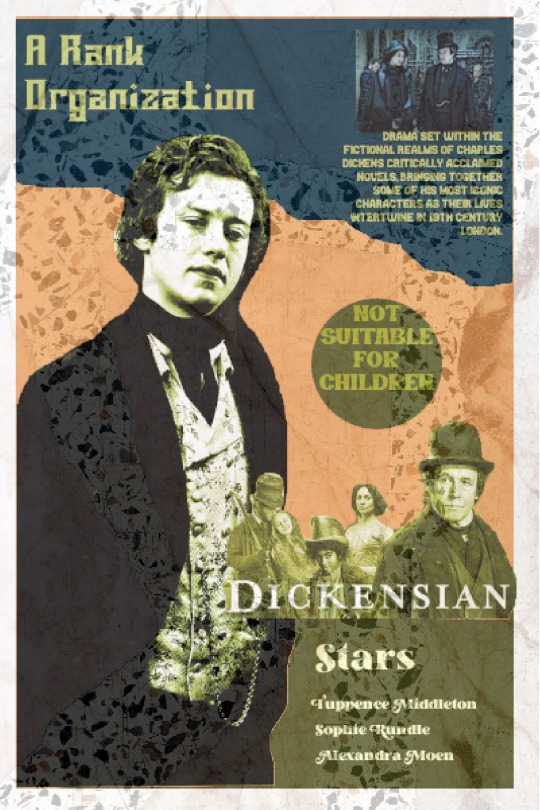
#dickensian#tv shows#bbc#tuppence middleton#sophie rundle#alexandra moen#illustration#vintage art#alternative movie posters
2 notes
·
View notes
Photo
por que você estava chorando?
eu não estava.
por que seu pai deixou de amar você, Arthur... por quê?




why were you crying? i wasn’t. why did your father stop loving you, arthur … why?
318 notes
·
View notes
Text
Today marks 9 years since the BBC One series DICKENSIAN, featuring Joseph Quinn as Arthur Havisham, first premiered in the UK. Happy Arthur Havisham day!
136 notes
·
View notes
Text
#eddie munson#stranger things#tom grant#make up movie#I luv ya roof#arthur havisham#bbc dickensian#bbc les miserables#enjolras#ralph penbury#ralph timewasters#the hoard#leonard blast#billy knight#bbc strike#koner#game of thrones#kin jamie#kin movie#the hoist#hash#catherine the great#prince paul
2 notes
·
View notes
Note
I saw you liked the BBC Radio comedy “Cabin Pressure”. What are thoughts on the delightfully bonkers Dickensian parody, “Bleak Expectations”?
I love it so much. I was thrilled to hear that there's going to be a West End stage version.
376 notes
·
View notes
Text
Still ❤️ Arthur.

He makes me so soft. He deserved better.


112 notes
·
View notes
Note
yo, got a podcast app recently (been getting into wolf 359, recommend it) and I vaguely remember you talking about a BBC audio programme a bit back. iirc it had Benedict cumberbatch in it?
hope you're doing good :)
ooooh hell yeahhh!
i have had that recommended to me before and i will try and get around to listening to it at some point.
so the one you’re talking about is:
Cabin Pressure by John Finnemore
it is available on the soundcloud website for free. It follows the four person crew of a small charter plane and is a comedy. it is excellent and probably my favourite radio show. there are 27 episodes.
now onto other recommendations
by the same writer is: - John Finnemores souviner programme. This is avalible on fourble (webpage) for free. it’s a comedy sketch show, and although theres some reoccurring characters theres no main plot. (except season 9 but that’s much later on lol). there is 9 seasons the last one released during lockdown.
another sketch show but this time in a museum! : - The Museum Of Everything. again on fourble. comedy with sketches usually based in/around the museum of everything. (though other places do occur and sometimes repeat (eg badger land)). probably my second favourite after cabin pressure.
if you want a crack comedy: - Bleak Expectations. again on fourble. batshit nonsense. has Anthony Head (uther) from BBC Merlin in it. (actually mr head also turns up in cabin pressure). theoretically set in dickensian victorian london. but gradually gets more outlandish and by the final season aliens are invading and anthony head is crossdressing and had married the main guy at least once lol
if you want a chuckle: - The Harpoon: A BBC Radio magazine for boys. 14 episodes are avalible on spotify (in audiobook format). an audio magazine, strong on the sound effects (compliment).
hopping over to america there is the well known Welcome to Nightvale podcast. very enjoyable with many overarching plots and The Weather (new songs every episode). a comedy but less laugh out loud than the suggestions above. on spotify.
if you wnat a much older radio show try: - The Navy Lark. whoever recruited these guys the the navy is an idiot. featuring characters such as the stock master who has many many relatives (and sticky fingers). again comedy. think it’s on fourble. they frequently crash boats and one episode somehow aquire every single chair in the navy.
and last but certainly not least: - Sherlock and Co. a modern day sherlock holmes adaptation on spotify. i would kill for these characters. seriously cannot recommend this enough to anyone and everyone. slightly less of a comedy but not without some funny moments.
if you or anyone else has questions about any of these lmk. i’ve tried to be as concise as possible but could ramble a lot more.
#gonna tag these shows in case anyone in them wants similar shows to listen to#cabin pressure#john finnemore#john finnemores souviner programme#the museum of everything#bleak expectations#the harpoon#welcome to nightvale#wtnv#the navy lark#navy lark#sherlock and co#sherlock & co#podcasts#radio show
7 notes
·
View notes
Text
New Charles Dickens adaptations coming to BBC Radio 4
New Charles Dickens adaptations coming to BBC Radio 4
BBC Radio 4 has launched Dickensian season of audio dramas, featuring new adaptations of Hard Times, Little Dorrit and Our Mutual Friend. You can read full details here. The season begins on Sunday 29 September. Broadcast details (and don’t forget BBC Sounds!) are: Hard Times episode 1/2, September 29, 3-4 pm Little Dorrit episode 1/3, October 13, 3-4 pm Our Mutual Friend 1/3, November 3, 3-4…
8 notes
·
View notes
Photo
Eu quero pegar ele no colo, posso pfvr ?
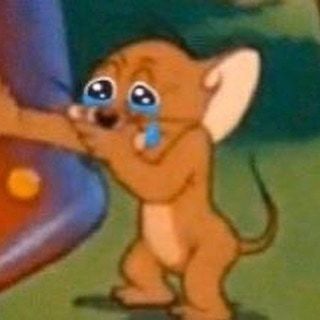
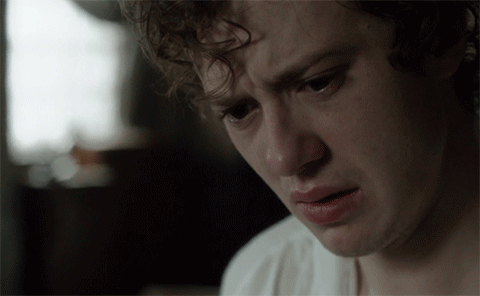
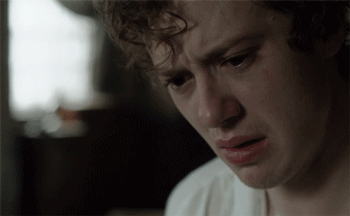

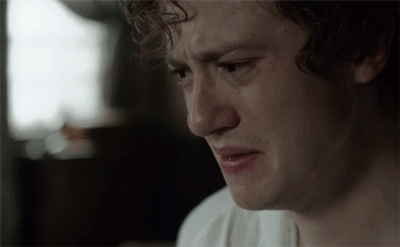

Arthur Havisham, Dickensian, Episode 20
73 notes
·
View notes
Note
I saw the new poster for season 6 and Terry is not in it but Kreese and Kim are UGhhhhHhhhhHHhHh already annoyed and disappointed
If you let Terry Silver in, he completely takes over the show. Which is what saved the show in S4, because how often can we see Kreese go, "This is really your last chance, Johnny. Are ya in or are ya out?" But you put Terry and John Kreese together, out Kreese goes, Johnny Lawrence who?? What kids? (Though I think he would have gone for Samantha, or, much more intriguingly, neglected Anthony in an effort to ensnare his Danny boi 🥰), Terry is impossible to contain! They might have thought that Kreese and Terry would be an epic finale adversary duo, but in my completely biased opinion, Thomas is too good a writer and too epic a fighter compared to all the other actors not to pull focus. We saw this in the third film already! Daniel is not afraid of Kreese, but Terry? There's too much history there. And it's Johnny especially that he completely wipes off the board. And with Johnny the main character, that's rather a problem. So I kind of get that they put him on a bus. You can't go back to Johnny x Daniel vs Kreese with him around. And Ralph and Billy do so love playing together. And they have so much to wrap up.
What I am annoyed about is that they still want Tang Soo Do to be the main antagonistic force. Casting Master Kim, bringing in Da Eun and fabricating some bond between her and their version of Kreese (we've seen how they write Terry, that's not the same character. I can make sense of it in my head, but still), which they seem the audience to want to take at face value, and yet they want to leave out Terry? Tang Soo Do was Terry's obsessions. The Sekai Taikai was Terry's idea. In the way they write him, Kreese isn't that fussed about Master Kim or Tang Soo Do in the first place. He seems to have gone to Korea to indulge Terry, he would have never tried for the Sekai Taikai. So to now make that all about Kreese again because the writers have a raging boner for Kreese and Johnny's bond even if they can't write it well enough to keep it interesting... That annoys me. You're going Tang Soo Do, you're dealing with Terry.
They didn't have to go there. They could have left Terry to his hors d'oeuvres in the first place, but they didn't. And then they tried to make it about Johnny when it never was, and they failed to properly involve Johnny as an adult.
And they're like: "Oh, but this is where the backstory is!" Newsflash, if you're good enough a character writer, you don't need that. Case in point, I saw a Great Expectations adaption lately. And since I'd seen BBC's Dickensian first, I thought that the characters of Arthur Havisham and Compeyson would be major presences in the main story. But they're not. At all. And that's fine, because what the BBC writers wrote in no way contradicts the novel. So even if Johnny and Kreese were originally more thinly drawn, that needn't have stopped the writers from making them characters that could carry a show for six seasons. But they can't! Without backstory, they're lost. So they can't think of anything without building on whatever crumbs of canon they haven't milked yet. And they can't handle Terry Silver, who is an amazingly rich character because TIG created him and is a better character writer apparently. They have trouble containing Ralph because he knows Daniel so well and has lived with him even more intensely than Billy has and is an amazing actor. But for all his gifts, Ralph is not a writer. He couldn't write a series for Daniel. Thomas could write a series for Terry! In fact, he wrote a film for Terry. It's called Excessive Force! Also, TIG himself conceeded that he thought the LawRusso angle would carry the series, and there would be no need for Terry. Apparently, not in these writers' hands. And now they're trying to put him back in a box while still milking Terry's backstory. And I get why, but it shows. It's like how they've replaced Aisha, an interesting well rounded character with ties to Sam and a great love of Cobra Kai, with Devon, a girl who has been given barely any personality. Imagine what Aisha in Cobra Kai in S3 could have meant for drama. Her relationship with Tory, Sam, and Johnny already there. Why not give her Kenny's arc? Because - and I know I'm being salty - that would take skill. What they also could have done? Leave Kreese in jail or write him out for a bit, send Da Eun home, deal with all the kids for five episodes, then once they arrive in the Sekai Taikai, have Terry come out with: "Surprise, bitch. This has always been my dream, and you've now stepped on my turf. I told you not to." Terry could have spun that story about the ref, he could have turned it on Daniel and Johnny and Chozen. And maybe there yet will be a storyline about Terry in there. Because logically, is prison where it would end with Da Eun taking his place? Come on!
10 notes
·
View notes